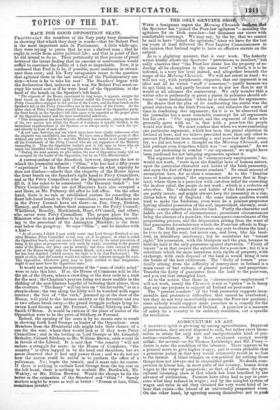THE ONLY -GENUINE SHO
WITH a benignant regret the Morning Ch the Spectator has "joined the Poor-law agitators "—meaning the agitators for an Irish poor-law--but dismisses our views with comfortable contempt. We may say, by the by, that we cannot be said to have "joined the agitators," since we have for the last ten years at least followed the Poor Inquiry Commissioners in the opinion that Ireland ought to have an effective statute on the
14140 subject.
As to a slighting manner, that is easy work. The fatherly writer kindly allows the Spectator "pretensions to intellect," but sadly observes that "the Poor-law cause has the property of re- ducing all its champions to the same level"; which, it is to be inferred, is a very low level indeed, and altogether beneath the range of the Morning Chronicle. We will not retort in kind : we will not say, with periphrastic etiquette, that our opponent is an idiot and all he writes "stuff o' nonsense,"—partly because we do not think so, and partly because we do not see that to say it would at all advance the controversy. We only wonder that a writer who is professedly so great a purist in polemics should ad- vance "mere declamation" when he is clamorous for arguments.
He denies that the plea of its confiscating the rental was the grand objection to the Irish Poor-law, and ridicules the waste of time in combating that argument ; for it is to be observed that the journalist has a most venerable contempt for all arguments but his own. " Our argument, and the argument of those who generally agree with us," is, that with a poor-law the people would not work. We must confess that when we were combating one particular argument, which has been the grand objection in Ireland at least, and we believe prevailed more than any other to prevent Parliament from enacting a real poor-law for that coun- try, we did not bestow a thought on the Morning Chronicle, and had perhaps even forgotten which was "our argument." As we were not professing to combat "our argument," we might have been pardoned for not bringing arguments against it. The argument that people in "eleemosynary employment," &c. would not work, "rests upon the familiar laws of human nature, upon the particular character and habits of the Irish peasantry, and upon the fact of their present conduct." No small amount of assumption here, for so close a reasoner. As to the "familiar laws of human nature," the argument would prove that in Eng- land, where there is a poor-law with out-door relief far exceeding the in-door relief, the people do not work ; which is a reduetio ad absurdum. The "character and habits of the Irish peasantry" are partly innate, and might always keep the peasantry in a con- dition below that of England : the same innate qualities would tend to make the Irishman, even were he a peasant proprietor having allodial possession of the soil, improvident, slovenly, mud- dling—a mere squatter on his own land. Partly the character and habits are the effect of circumstances ; prominent circumstances being the absence of a poor-law, the consequent concealment of the pauperizing process, and the desperation arising from the want of that guarantee for subsistence which the Poor-law affords in Eng- land. The Irish peasant will promise any rent to obtain the land ; he tries to pay the rent, but never can, and lives, like his land- lord, in hereditary insolvency; but he maintains his "tenant right," his possession, with the bludgeon and the gun, because to hold the land is the only guarantee against starvation. "Fixity of tenure "is in that respect the substitute for a poor-law ; but it is a substitute which far more interferes with rights of property, with exchange, with such disposal of the land as would bring it into the hands of the best cultivators. The "fixity of tenure" prac- tically arising from the difficulty of conveyance in Ireland is a main cause of bad culture, of general poverty, and pauperism. Transfer the fixity of guarantee from the land to the poor-rate, and you cut that entangled knot. As to the notion that those in "eleemosynary employment " will not work, surely the Chronicle is not so "green" as to fancy that any one proposes to support all Ireland on poor-rates !
The "present conduct" of the Irish peasantry suggests innu- merable and protentous difficulties, that cannot be overlooked ; but they do not very immediately concern the Poor-law question; since nobody would suggest mere poor-law as a remedy for the present monstrous condition of Ireland. A poor-law is a measure of safety for a country in its ordinary condition, not a specific for revolution.


























 Previous page
Previous page